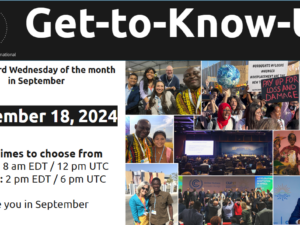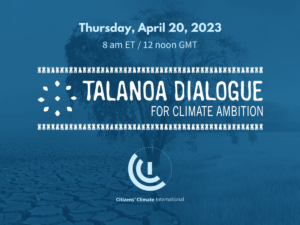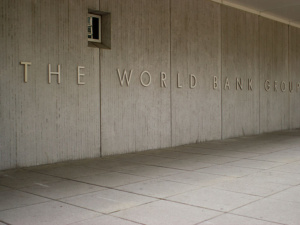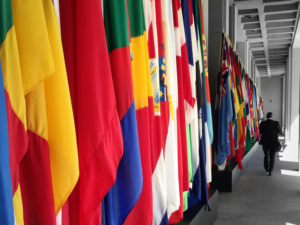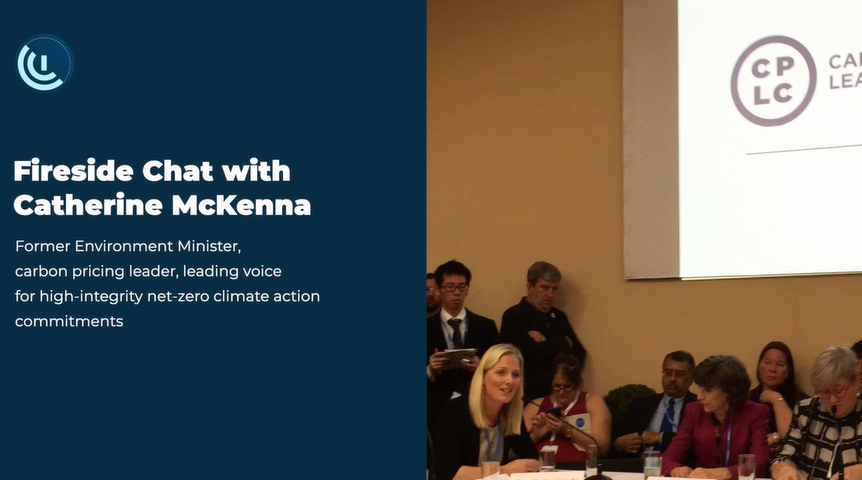
On Valentine’s Day 2023 Marin Chaveyriat, a climate leader from CCL France, facilitated a fireside chat with the Honourable Catherine McKenna. The love for the planet and evidence-based policies that will drastically cut fossil fuel pollution was clearly evident in the conversation.
Catherine McKenna Bio
The Honourable Catherine McKenna was Canada’s Minister of the Environment and Climate Change (2015-2019) and she was a lead negotiator of the Paris Agreement (in particular Article 6 concerning carbon pricing). She then successfully negotiated Canada’s first comprehensive climate change plans with provinces, territories and Indigenous communities. This resulted in putting a price on carbon across Canada — a policy that was successfully upheld at the Supreme Court. She also led efforts to phase out coal, reduce plastics in oceans and waterways, and doubled the amount of nature protected in Canada in partnership with Indigenous Peoples. While in government, she helped establish the Powering Past Coal Alliance (with Canada, the UK and Bloomberg Philanthropies), and was Co-Chair of the World Bank’s Carbon Pricing Leadership Coalition.
After leaving politics she founded Climate and Nature Solutions, an advisory firm that works with governments, corporations, foundations and universities to scale practical climate and nature-based solutions.[ She also joined Columbia University’s Centre on Global Energy Policy and Climate School. In 2022 chaired the United Nations High-Level Expert Group on the Net-Zero Emissions Commitments of Non-State Entities which issued the landmark report, Integrity Matters: Net Zero Commitments by businesses, financial institutions, cities and regions .
Marin Chaveyriat
My name is Marin Chaveyriat, I am 25 years old and I live in France (Paris’ suburbs).
When I was in high school, I was reading stuff about climate and the environment and I thought it was concerning. That’s why I went to do a biology/ecology bachelor degree at Université Paris-Sud. During my bachelor, the more I learned about ecology, the more it was interesting and the more I thought the problem wasn’t going to solve itself. My professors sometimes expressed concerns over climate change and biodiversity loss at the end of their lectures, but rarely talked about solutions. I continued on this track to do a master degree in environmental science at AgroParisTech (#1 agronomics and life science engineering school).
During my master degree I randomly discovered about CCL and carbon pricing. Despite being interested in climate change stuff for years, I never heard of carbon pricing before. Maybe because I was more on the environmental science side of the subject. But most climate NGO with big public audience don’t talk about it. Both the solution proposed (carbon pricing) and the method used to implement it (citizens lobbying) made sense, so I decided to join CCL.
I was involved with CCL for almost 1 year when I had the opportunity to participate to COP26 in Glasgow. I saw that as an opportunity to promote carbon pricing there. Since only few countries implemented it significantly, surely the others haven’t thought about it! (maybe I was a bit naive) So I made a flyer that i distributed to people I came across and knocked on ambassy doors to give it to negotiators (flyer is attached to this email). As days passed in Glasgow, I realized carbon pricing was hardly discussed during COPs: discussions operate at a higher level (emissions reduction targets, etc) and States are sovereign.
That’s when I understood that CCL was just at the right level to give more momentum to carbon pricing worldwide: lobbying directly to the Governments! So I decided to drop everything I did and get involved 100% in CCL France. That’s where I am today! Through my involvment in CCL, I am learning a lot about carbon pricing of course, but also about the importance of all the core values by CCL.
Integrity Matters
Integrity Matters
At COP 27 in Egypt the UN High-Level Expert Group on net-zero commitments (HLEG) launched its report Integrity matters: Net zero commitments by businesses, financial institutions, cities and regions The goal of the group was to develop stronger and clearer standards for net-zero emissions pledges by non-State entities. The group was led by the Honourable Catherine McKenna, Canada’s former Minister for the Environment and Climate Change
Secretary-General António Guterres said: “A growing number of governments and non-state actors are pledging to be carbon-free – and obviously that’s good news. The problem is that the criteria and benchmarks for these net-zero commitments have varying levels of rigor and loopholes wide enough to drive a diesel truck through. We must have zero tolerance for net-zero greenwashing.”
The HLEG resource aims to develop stronger and clearer standards for net-zero emissions pledges by non-state entities and speed up their implementation. The report provides clarity in four key areas – environmental integrity, credibility, accountability and the role of governments.
The report is organized under five principles and ten recommendations.
Five principles
1. Ambition which delivers significant near— and medium —term emissions reductions on a path to
global net zero carbon dioxide emissions by 2050 and net zero greenhouse gas emissions soon after
2. Demonstrated integrity by aligning commitments with actions and investments
3. Radical transparency in sharing relevant, non-competitive, comparable data on plans and progress
4. Established credibility through plans based in science and third-party accountability
5. Demonstrable commitment to both equity and justice in all actions
Ten Recommendations -detail what non-state actors need to consider through each stage of their progress towards achieving net-zero ambitions and addressing the climate crisis.
1. Announcing a Net Zero Pledge
2. Setting Net Zero Targets
3. Using Voluntary Credits
4. Creating a Transition Plan
5. Phasing out of Fossil Fuels and Scaling Up Renewable Energy
6. Aligning Lobbying and Advocacy
7. People and Nature in the Just Transition
8. Increasing Transparency and Accountability
9. Investing in Just Transitions
10. Accelerating the Road to Regulation
IN A NUTSHELL
Here are some key takeaways from the HLEG Integrity Matters: Technologies must come as advertised, there are limits on the use of carbon offsets, no new fossil fuel infrastructure, a plan for unwinding from fossil fuels, no being aligned with groups that lobby for fossil fuels and investments must be made in a just-transition.


